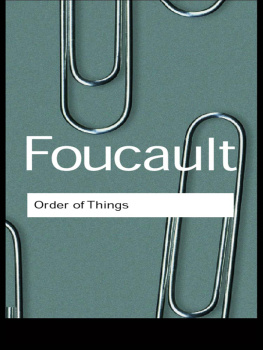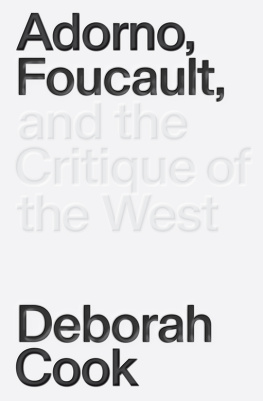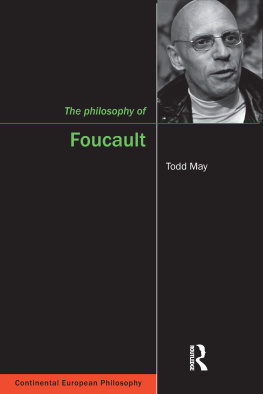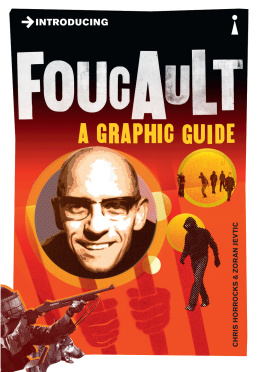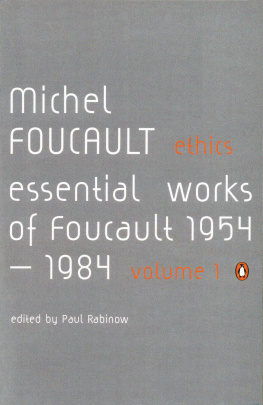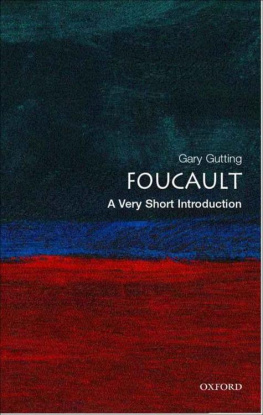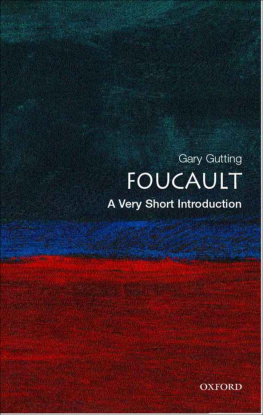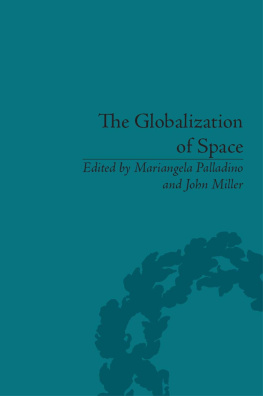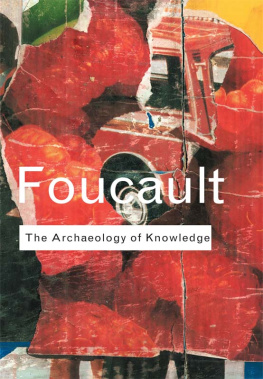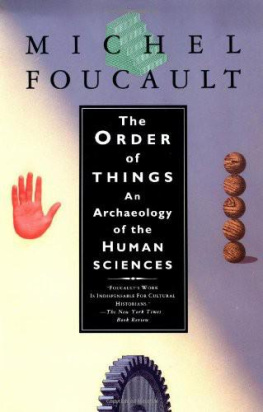Foucault - The Order Of Things
Here you can read online Foucault - The Order Of Things full text of the book (entire story) in english for free. Download pdf and epub, get meaning, cover and reviews about this ebook. publisher: Taylor & Francis, genre: Science. Description of the work, (preface) as well as reviews are available. Best literature library LitArk.com created for fans of good reading and offers a wide selection of genres:
Romance novel
Science fiction
Adventure
Detective
Science
History
Home and family
Prose
Art
Politics
Computer
Non-fiction
Religion
Business
Children
Humor
Choose a favorite category and find really read worthwhile books. Enjoy immersion in the world of imagination, feel the emotions of the characters or learn something new for yourself, make an fascinating discovery.
The Order Of Things: summary, description and annotation
We offer to read an annotation, description, summary or preface (depends on what the author of the book "The Order Of Things" wrote himself). If you haven't found the necessary information about the book — write in the comments, we will try to find it.
Foucault: author's other books
Who wrote The Order Of Things? Find out the surname, the name of the author of the book and a list of all author's works by series.
The Order Of Things — read online for free the complete book (whole text) full work
Below is the text of the book, divided by pages. System saving the place of the last page read, allows you to conveniently read the book "The Order Of Things" online for free, without having to search again every time where you left off. Put a bookmark, and you can go to the page where you finished reading at any time.
Font size:
Interval:
Bookmark:
The Order of Things
The Order of Thingssold out within a month after it first appeared or so goes the advertising legend. The work numbers among those outward signs of culture the trained eye should find on prominent display in every private library. Have you read it? Ones social and intellectual standing depends on the response... Foucault is brilliant (a little too brilliant). His writing sparkles with incisive formulations. He is amusing. Stimulating. Dazzling. His erudition confounds us; his skill compels assent; his art seduces.
Michel de Certeau
Foucaults most important work.
Hayden V. White
One is left with a sense of real and original force.
George Steiner
The Order of Thingsstudies the ways in which people accept the taxonomies of an epoch without questioning their arbitrariness... Even scholars who are in a position to scold Foucault... admit his brilliant ingenuity and scholarly resource.
Frank Kermode
InThe Order of Things, Foucault investigates the modern forms of knowledge (or epistemes) that establish for the sciences their unsurpassable horizons of basic concepts.
Jrgen Habermas

Velasquez: Las Meninas, reproduced by courtesy of the Museo del Prado.
Michel
Foucault
The Order of Things
An archaeology of the human sciences

Les mots et les choses first published 1966
by Editions Gallimard, Paris
English edition first published in the United Kingdom 1970
by Tavistock Publications
First published by Routledge 1989
First published in Routledge Classics 2002
by Routledge
11 New Fetter Lane, London EC4P 4EE
29 West 35th Street, New York, NY 10001
Routledge is an imprint of the Taylor & Francis Group
This edition published in the Taylor and Francis e-Library, 2005.
To purchase your own copy of this or any of Taylor & Francis or Routledges
collection of thousands of eBooks please go to www.eBookstore.tandf.co.uk.
1966 Editions Gallimard
English translation 1970 Tavistock/Routledge
Foreword to the English edition 1970 Michel Foucault
All rights reserved. No part of this book may be reprinted or reproduced or utilised in any form or by any electronic, mechanical, or other means, now known or hereafter invented, including photocopying and recording, or in any information storage or retrieval system, without permission in writing from the publishers.
British Library Cataloguing in Publication Data
A catalogue record for this book is available from the British Library
ISBN 0-203-99664-X Master e-book ISBN
ISBN 0415267366 (hbk)
ISBN 0415267374 (pbk)
C ONTENTS
P UBLISHERS N OTE
A literal translation of the title of the French edition of this work (Les Mots et les choses) would have given rise to confusion with two other books that have already appeared under the title Words and things. The publisher therefore agreed with the author on the alternative title The order of things, which was, in fact, M. Foucaults original preference.
In view of the range of literature referred to in the text, it has not proved feasible in every case to undertake the bibliographical task of tracing English translations of works originating in other languages and locating the passages quoted by M. Foucault. The publisher has accordingly retained the authors references to French works and to French translations of Latin and German works, for example, but has, as far as possible, cited English editions of works originally written in that language.
F OREWORD TO THE E NGLISH E DITION
This foreword should perhaps be headed Directions for Use. Not because I feel that the reader cannot be trusted he is, of course, free to make what he will of the book he has been kind enough to read. What right have I, then, to suggest that it should be used in one way rather than another? When I was writing it there were many things that were not clear to me: some of these seemed too obvious, others too obscure. So I said to myself: this is how my ideal reader would have approached my book, if my intentions had been clearer and my project more ready to take form.
1. He would recognize that it was a study of a relatively neglected field. In France at least, the history of science and thought gives pride of place to mathematics, cosmology, and physics noble sciences, rigorous sciences, sciences of the necessary, all close to philosophy: one can observe in their history the almost uninterrupted emergence of truth and pure reason. The other disciplines, however those, for example, that concern living beings, languages, or economic facts are considered too tinged with empirical thought, too exposed to the vagaries of chance or imagery, to age-old traditions and external events, for it to be supposed that their history could be anything other than irregular. At most, they are expected to provide evidence of a state of mind, an intellectual fashion, a mixture of archaism and bold conjecture, of intuition and blindness. But what if empirical knowledge, at a given time and in a given culture, did possess a well-defined regularity? If the very possibility of recording facts, of allowing oneself to be convinced by them, of distorting them in traditions or of making purely speculative use of them, if even this was not at the mercy of chance? If errors (and truths), the practice of old beliefs, including not only genuine discoveries, but also the most nave notions, obeyed, at a given moment, the laws of a certain code of knowledge? If, in short, the history of non-formal knowledge had itself a system? That was my initial hypothesis the first risk I took.
2. This book must be read as a comparative, and not a symptomatological, study. It was not my intention, on the basis of a particular type of knowledge or body of ideas, to draw up a picture of a period, or to reconstitute the spirit of a century. What I wished to do was to present, side by side, a definite number of elements: the knowledge of living beings, the knowledge of the laws of language, and the knowledge of economic facts, and to relate them to the philosophical discourse that was contemporary with them during a period extending from the seventeenth to the nineteenth century. It was to be not an analysis of Classicism in general, nor a search for a Weltanschauung, but a strictly regional study.
But, among other things, this comparative method produces results that are often strikingly different from those to be found in singlediscipline studies. (So the reader must not expect to find here a history of biology juxtaposed with a history of linguistics, a history of political economy, and a history of philosophy.) There are shifts of emphasis: the calendar of saints and heroes is somewhat altered (Linnaeus is given more space than Buffon, Destutt de Tracy than Rousseau; the Physiocrats are opposed single-handed by Cantillon). Frontiers are redrawn and things usually far apart are brought closer, and vice versa: instead of relating the biological taxonomies to other knowledge of the living being (the theory of germination, or the physiology of animal movement, or the statics of plants), I have compared them with what might have been said at the same time about linguistic signs, the formation of general ideas, the language of action, the hierarchy of needs, and the exchange of goods.
Next pageFont size:
Interval:
Bookmark:
Similar books «The Order Of Things»
Look at similar books to The Order Of Things. We have selected literature similar in name and meaning in the hope of providing readers with more options to find new, interesting, not yet read works.
Discussion, reviews of the book The Order Of Things and just readers' own opinions. Leave your comments, write what you think about the work, its meaning or the main characters. Specify what exactly you liked and what you didn't like, and why you think so.

